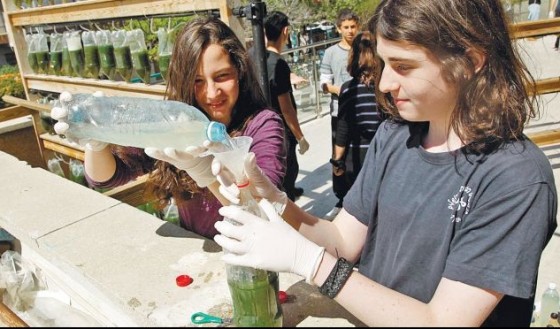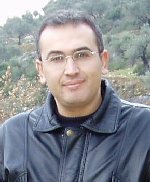Liquid algae may taste like sushi which is unknown in poor parts of Africa, but it is easy to grow with basic equipment like old plastic bottles, and it is packed full of protein – a veritable superfood. Just ask the Japanese who consume algae and algae derivatives as a way of life. Now, kids from an Israeli highschool are perfecting an algae growing system started in Kibbutz Ein Shemer (and which we reported on here) so that algae farms can made in communities in Africa to wipe out malnutrition in areas where desertification claims land and livestock. The local Israeli newspaper Haaretz reports that the project will be multiplied by ten and replicated at Jewish and Arab highschools in the region.
According to Haaretz pupils at the Herzliya Hebrew Gymnasium are working on a growth system for Spirulina, an algae that’s been dubbed the “superfood” because it contains 70% protein.
Algae isn’t filling the stomach, but at least it’s nutritious, say the students growing the algae medium in old plastic soda bottles (see more on the original algae project here). Aerating the mixture with a bubbler, it prevents the need for them to take the bottles home and shake them by hand – as algae needs ample sunlight, and carbon dioxide to grow.
The kids’ project is so promising that UNESCO, Rotary International, and international education organizations and dozens of African schools are interested to know more about how it’s done.
The pupils are working on a system so that it can be done in areas in Africa where food is scarce. The algae, which is a plant-based micro-organism, and the slime you find on the inside of your swimming pool, could potentially feed millions of people. (This article here suggests that eating algae is what has made Homo sapiens human).
To grow the project the kids have set up an NGO called Algeed. Soon they will replicate the project in other schools and within a year hope to take their bottles and bubblers to the world market.

Image from the Kibbutz Ein Shemer algae project
Overseers include Boris Zlotnikov who has a Spirulina farm in the Negev and Yaron Yehoshua, who is the founder of the Algae Biotechnology Center at Bar-Ilan University. Both volunteer to help out the kids.
“We still have a series of experiments in front of us: Temperature differences, different concentrations of the food that’s the basis for the algae, [amounts of] light and different growing methods − in plastic bags, for instance,” Yehoshua says.
At the end of the process, he says, “We’ll reach the optimal growing conditions and build a model that will increase the protein concentration in the algae.”
Israel has a pile of algae companies that are trying to grow the green stuff as a biofuel stock and for the nutraceutical and fish farming market. I’ve personally interviewed most of them (like Isaac Berzin), including leaders at research universities. If a little more professional guidance and investment is put into this project it could very well change the face of hunger.
::Haaretz (subscription may be required to access article)





Now that the most extreme forms of descrimination have been mostly ended, the only reason there are hungry people anywhere on Earth is because there are too many, and that too can be ended with family planning education in which every woman is given the legally protected right to decide if and when to conceive and birth her children. Given that freedom the vast majority would choose to birth no more than 1, 2 or 3, in which case there would be plenty of food and other resources for everyone around the World.